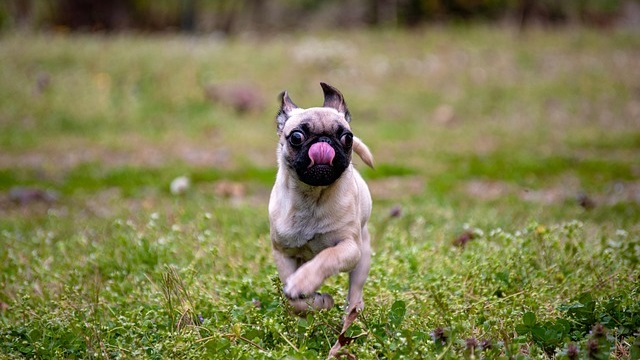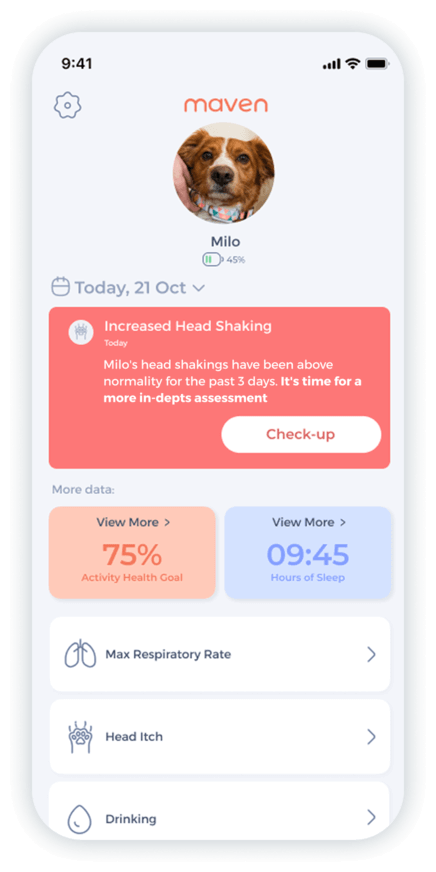Why Is My Dog Always Hungry? Understanding Appetite Changes (Vet Verified)
Even though our pooches show the gluttonous side of their personality all the time, especially when we are seated at a table and they are giving us those puppy eyes begging for a morsel, it’s not always just pure interest in food. If your dog is constantly hungry and feels that way even after eating, there could be some underlying medical issues at play.
In this article, we will answer the question, “Why is my dog always hungry?” and provide you with pointers on how to identify potential issues.
- Persistent hunger can be normal (food-motivated breeds, life stages) or indicate medical issues like diabetes, Cushing’s, or thyroid disorders.
- Sudden appetite changes, weight loss despite eating, increased thirst/urination, vomiting, or behavior shifts warrant a vet visit.
- Maven Pet’s smart collar and app track activity, vital signs, and behaviors to detect health trends early and guide interventions.
Why Is My Dog Always Hungry?

Your dog might always seem hungry either because they simply love food, or because there’s an underlying health issue making them feel that way. It’s difficult to tell, especially with some breeds. Labradors, Golden Retrievers, and Beagles are natural chowhounds that will never turn down a meal, even if their lives depended on it.
However, a non-stop surge of appetite can also point to medical problems such as diabetes, Cushing’s disease, or thyroid issues. These conditions can affect the nutrient absorption and leave the dog unsatisfied.
It could also be a psychological matter. You have people who eat a lot when they are under stress, so why wouldn’t dogs? It could also be a type of learned behaviour, so they are not truly hungry at all. Getting the answer right is the tricky bit, and that’s why we are here.
Why Is My Female Dog Always Hungry?
If you are wondering, “Why is my female dog always hungry?”, don’t assume that female dogs are automatically hungrier than male ones. They are not. The breed, the portion sizes, and overall health are still the most important factors in determining the appetite. However, hormones and life stages can change the picture in an instant. Take pregnancy or nursing, for example.
A mom-to-be or a mom with puppies to feed will burn through calories fast, and that hunger is her body’s way of keeping up with the demand. Also, if your dog has been spayed, her metabolism may slow a bit, so if her meals don’t adjust, she may act like she’s starving.
Why Is My Senior Dog Always Hungry?
Your senior dog may always seem hungry because of age-related changes in metabolism. The less active they are, the less food they need. Or, the answer to the question: “why is my senior dog always hungry” may lie in health problems that become more common in older dogs.
As dogs get older, their bodies handle food differently. Some lose muscle and burn calories faster, while others develop conditions like diabetes, thyroid disease, or even dementia that can crank up appetite. Medications, especially for arthritis or long-term illnesses, can also make them hungrier than before.
“I got the Maven sensor for my 14-year-old Chihuahua mix with heart and trachea issues. It gave me back peace of mind – I can track her RRR, BPM, drinking, and activity anytime and know instantly if something’s wrong. Highly recommend!”

★★★★★
Chiara De Luca
Titti
Normal vs. Concerning Reasons for Increased Appetite
A dog that always seems hungry isn’t automatically a problem. Sometimes it’s perfectly normal, other times it’s a red flag. Here’s a quick comparison:
| Normal Reasons | Concerning Reasons |
| Food-driven breeds | Diabetes (can’t regulate blood sugar) |
| Different growth stages (especially puppies) | Cushing’s disease (excess cortisol) |
| Pregnancy or nursing | Hyperthyroidism or thyroid imbalance |
| High-intensity activities | Malabsorption or digestive disorders |
| Habit | Certain medications (steroids, anticonvulsants) |
| New routine or a change | Sudden appetite changes in seniors |
Even if your dog fits into the “normal” column, pay attention to patterns. If you notice intense hunger that doesn’t match the dog’s activity level or age, it could be a sign to see a vet.
When to Talk to a Vet

You should call your vet if your dog’s appetite suddenly changes or if constant hunger comes with other warning signs.
Look for these:
- Sudden spike in appetite that wasn’t there before
- The dog is losing weight despite eating more
- Increased thirst or urination (could indicate diabetes or Cushing’s)
- Vomiting and diarrhea
- Changes in behavior
- The dog is begging for food, and it usually doesn’t
A healthy dog usually acts in the same way every day. Any sharp turn that their appetite takes is a signal that their body is working overtime. A vet can run different tests to make sure their health is not jeopardized. Sure, it would be best if you had pet health tracker devices in action to help you track these changes, but just by observing your dog and its habits, you can determine when it’s time to bring in the vet.
“Some dogs are naturally food-motivated, but a sudden or persistent increase in appetite — especially in senior dogs — can signal an underlying health condition that needs veterinary attention.” – Carolina Domingues, DVM at Maven Pet
How the Maven Pet Health Monitor Helps Track Behavior and Health Trends
When you bring in the cavalry in the form of a pet health app, Maven Pet is the knight in shiny armour. First of all, it turns your pup’s everyday collar into a smart collar, so we are talking about a 24/7 insight into what’s really going on.


Monitor heart rate, respiratory rate, activity & rest, drinking, itch behavior.
It doesn’t just track activity and rest. No sir. It also monitors heart rate, respiratory rate, drinking habits, and even itch behaviors. That means if your dog’s increased appetite is linked to a medical issue, you’re more likely to catch it early, before it turns into something serious.
Think of it as a Fitbit for dogs, but with vet-level data. The sensor is lightweight, waterproof, and designed to handle rough play. Plus, it’s connected to the Maven app, which delivers daily, weekly, and monthly reports, complete with personalized tips so you know exactly what changes to watch for.
Conclusion
As concerning as what might seem as an insatiable appetite in your dog is, it’s not always a red flag. Sometimes it’s just breed or habit, and other times it’s a clear health signal. Pay attention to patterns, watch for sudden changes, and don’t hesitate to involve your vet. With tools like Maven Pet, you can track appetite and health trends early, giving your pup the best chance at staying happy and healthy.
Maven Pet focuses on improving the quality of life of our pets with technology, using artificial intelligence (AI) to enable proactive pet care. By accurately collecting and monitoring pet data 24/7 and flagging any irregularities, Maven Pet empowers pet parents and veterinarians to stay ahead of potential health issues, ensuring the well-being and longevity of our beloved companions.




